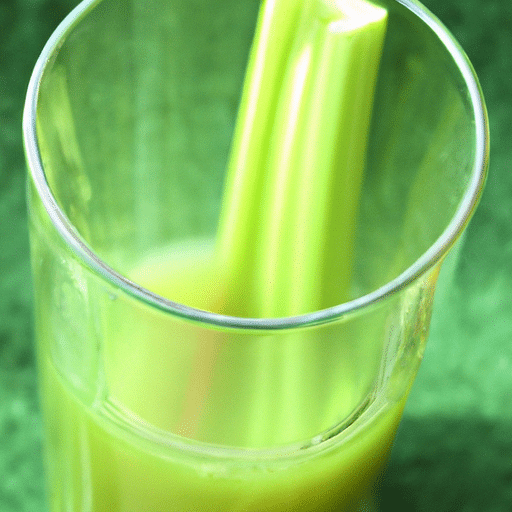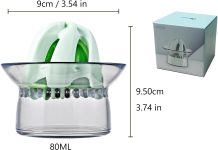Curious about the health benefits of celery? We delve into the age-old question: is eating celery the same as drinking celery juice? Many have hopped on the celery juice trend, claiming it detoxifies and aids digestion. But does the act of juicing really make a significant difference? Join us as we uncover the truth behind this green vegetable and its potential health benefits.
Review contents
Benefits of Celery
Celery is a versatile vegetable that offers numerous health benefits. From its nutritional content to its role in weight management, celery has become increasingly popular in the health and wellness community. Let us explore the various advantages of incorporating celery into our diet.
Nutritional Content
Celery is rich in essential nutrients that are vital for our overall health. It contains vitamins such as vitamin K, vitamin C, and vitamin B6, which play crucial roles in supporting our immune system, maintaining healthy skin, and promoting proper brain function. Additionally, celery is a good source of minerals like potassium, magnesium, and folate, which contribute to the healthy functioning of our cells and organs.
Hydration
With its high water content, celery is an excellent way to stay hydrated throughout the day. Proper hydration is essential for maintaining optimal bodily functions, such as regulating body temperature, delivering nutrients to cells, and aiding in digestion. By including celery in our diet, we can help meet our daily hydration needs while enjoying its refreshing and crisp taste.
Digestive Health
Celery is known for its positive impact on digestive health. It contains dietary fiber, which aids in promoting regular bowel movements and preventing constipation. Fiber also acts as a prebiotic, nourishing the beneficial bacteria in our gut and supporting a healthy digestive system. Incorporating celery into our meals can contribute to a balanced and efficient digestive process, ensuring overall well-being.
Weight Management
Celery is a great addition to a weight management plan due to its low calorie and high fiber content. Since it is predominantly made up of water and fiber, celery provides a feeling of fullness without adding excessive calories to our diet. Including celery as a snack or as part of a meal can help curb hunger, prevent overeating, and support weight loss or weight maintenance goals.
Anti-Inflammatory Properties
The anti-inflammatory properties of celery make it a valuable ingredient in promoting our body’s natural inflammatory response. Celery contains antioxidants and phytochemicals, such as apigenin and quercetin, which play a role in reducing inflammation and fighting oxidative stress. By incorporating celery into our diet, we can potentially reduce the risk of chronic inflammation-related diseases, such as heart disease and certain types of cancer.
Antioxidants
Celery is a rich source of antioxidants, substances that help protect our cells from damage caused by harmful free radicals. Free radicals are byproducts of normal bodily processes but can become harmful when their levels exceed the body’s antioxidant defenses. The antioxidants in celery, such as flavonoids and vitamin C, can neutralize these free radicals, thus reducing the risk of oxidative stress-related diseases and supporting overall health.
Celery Juice
Celery juice has gained significant attention in recent years as a popular health trend. Let’s delve into the specifics of celery juice, from its extraction process to its potential benefits and controversies.
Extraction Process
To obtain celery juice, fresh celery stalks are typically washed, chopped, and then processed through a juicer or blender. The resulting liquid is strained to remove any remaining pulp, resulting in a smooth and concentrated juice.
Nutrient Concentration
Celery juice offers a concentrated dose of the vegetable’s nutrients, as it is devoid of the fibrous pulp. Consequently, a glass of celery juice contains higher quantities of vitamins, minerals, antioxidants, and phytochemicals compared to consuming whole celery stalks.
Benefits
Drinking celery juice is said to provide numerous benefits for our health. Some proponents claim that it can aid in detoxification, improve digestion, reduce inflammation, and promote clear skin. While individual experiences may vary, many individuals who have incorporated celery juice into their daily routine report feeling more energized and experiencing improvements in various aspects of their health.
Detoxification
One of the main claims associated with celery juice is its potential detoxifying effects. Advocates assert that the high concentration of nutrients in celery juice supports the liver’s detoxification processes, helping to rid the body of toxins and waste products. However, it is important to note that the liver and kidneys are primarily responsible for detoxification, and no single food or drink can replace the natural detoxification processes of the body.
Anti-Inflammatory Effects
Celery juice, with its inflammation-fighting properties, has been recommended by some as a natural remedy for conditions such as arthritis and inflammatory bowel disease. The antioxidants and phytochemicals present in celery juice can contribute to reducing inflammation in the body. However, it is important to remember that celery juice alone is not a cure-all solution, and it should not replace medical advice or treatment for chronic inflammatory conditions.
Claims and Controversies
While there are numerous anecdotal accounts of the benefits of celery juice, scientific research on its specific effects is limited. It is essential to approach any health claims with caution and skepticism, as more studies are needed to provide robust evidence. Additionally, it is important to consider individual differences and consult with healthcare professionals before making significant changes to our diet or treatment plans.
Eating Whole Celery
While celery juice has gained popularity, eating whole celery stalks should not be overlooked. Let’s explore the advantages of consuming celery in its natural form.
Nutritional Content
Much like celery juice, whole celery contains essential vitamins, minerals, and antioxidants. However, when consuming whole celery stalks, we also benefit from the natural fiber content.
Fiber Content
Fiber is a crucial component of a healthy diet, and celery offers a good source of both soluble and insoluble fiber. Soluble fiber aids in promoting healthy cholesterol levels and maintaining stable blood sugar levels, while insoluble fiber contributes to regular bowel movements and digestive health. By consuming whole celery, we can obtain the full spectrum of fiber-related benefits.
Hydration
Whole celery stalks also contribute to our hydration needs due to their high water content. By incorporating celery as a raw snack or adding it to salads and other dishes, we can increase our water intake and support overall hydration.
Digestive Health
The fibrous nature of whole celery promotes healthy digestion by adding bulk to our stool, aiding in regularity, and preventing constipation. Chewing celery stimulates saliva production, which begins the digestive process and prepares our bodies to efficiently absorb nutrients.
Weight Management
Just like celery juice, eating whole celery can support weight management goals. Its high fiber content can help us feel fuller for longer, reducing the temptation to overeat or snack on less nutritious options. Additionally, the act of chewing celery requires time and effort, which can contribute to a heightened sense of satisfaction and portion control.
Chewing and Digestion
It is worth noting that chewing whole celery stalks provides an additional sensory experience and contributes to the overall enjoyment of a meal. Chewing stimulates the release of digestive enzymes, facilitating the breakdown of food and enhancing nutrient absorption. By savoring the act of chewing, we can foster mindful eating practices and improve our digestion.
Differences in Consumption
While both celery juice and eating whole celery offer health benefits, there are distinct differences to consider when choosing to incorporate them into our diet. Let’s explore some of these variations:
Nutrient Absorption
The extraction process of celery juice removes the fibrous pulp, resulting in a liquid that is easier for our bodies to absorb and digest. This may be particularly beneficial for individuals with digestive issues or those looking for a quick nutrient boost. On the other hand, consuming whole celery allows for slower digestion and the release of nutrients over a longer period of time.
Fiber Content
The most significant difference between celery juice and whole celery is the fiber content. Celery juice lacks the fiber present in the pulp of whole celery stalks. While the concentrated juice may provide higher nutrient levels, the absence of fiber can affect digestion and the overall health benefits associated with fiber intake.
Satiety
Due to its fiber content, eating whole celery may offer a greater sense of satiety compared to drinking celery juice. The fiber in whole celery contributes to feelings of fullness and satisfaction, which may aid in portion control and weight management.
Digestive Benefits
Both celery juice and whole celery can promote digestive health, but the presence of fiber in whole celery further supports regular bowel movements and a healthy gut microbiome. The insoluble fiber in whole celery provides bulk to our stool, aiding in the efficient elimination of waste products and maintaining a healthy digestive system.
Hydration
While both forms of celery contribute to hydration, whole celery stalks contain higher water content due to the absence of the extraction process. Snacking on whole celery can be an effective way to increase water intake and support optimal hydration.
Texture and Sensory Experience
The difference in consumption between celery juice and whole celery is also reflected in the texture and sensory experience. Celery juice offers a smooth and concentrated liquid, while whole celery provides a satisfying crunch and the enjoyment of chewing. Personal preference plays a significant role in deciding which form of celery to incorporate into our diet.
Comparison of Nutritional Benefits
When comparing the nutritional benefits of celery juice and whole celery, several factors come into play. Let’s examine each aspect in detail:
Vitamin and Mineral Content
Celery juice and whole celery both contain essential vitamins and minerals; however, the concentration may differ due to the extraction process in celery juice. Levels of vitamin C, vitamin K, and vitamin B6 may be higher in celery juice due to the absence of fiber and higher extraction rates. However, whole celery stalks still provide significant amounts of these vitamins, along with additional benefits from the fiber content.
Antioxidants
Both forms of celery possess antioxidant properties, but the concentration may vary. Celery juice, being a concentrated liquid, may contain higher levels of antioxidants, contributing to its potential anti-inflammatory effects. However, whole celery still provides a notable amount of antioxidants, supporting our overall health and well-being.
Phytochemicals
Phytochemicals, such as apigenin and quercetin, are bioactive compounds found in celery that have been associated with anti-inflammatory and antioxidant effects. While celery juice may offer a higher concentration of these phytochemicals, whole celery stalks still provide substantial amounts, especially in the fibrous pulp.
Detoxification
Both celery juice and whole celery can contribute to the body’s natural detoxification processes. While celery juice is often marketed as a detoxifying elixir due to its concentrated nutrient content, whole celery’s fiber content supports the removal of waste products and toxins from the body.
Weight Management
When it comes to weight management, both forms of celery can be beneficial. Celery juice, with its low calorie and high nutrient content, can aid in a calorie-controlled diet and contribute to feelings of fullness. Whole celery, on the other hand, offers the added benefit of fiber, which promotes satiety and supports healthy digestion.
Digestive Health
Both celery juice and whole celery offer digestive benefits, but the presence of fiber in whole celery enhances these effects. The fiber in whole celery contributes to regular bowel movements, helps maintain a healthy gut microbiome, and aids in overall digestive health.
Implications for Weight Loss
Celery, whether consumed as juice or whole, can be a helpful addition to a weight loss plan due to its unique properties. Let’s explore the implications of celery on weight loss:
Caloric Content
Both celery juice and whole celery have a low caloric content, making them suitable options for those trying to lose weight. Incorporating celery into meals or snacks can provide a satisfying volume of food without contributing excessive calories, allowing for a more balanced and enjoyable weight loss journey.
Satiety and Hunger Control
The fiber content in celery, especially when consumed as whole stalks, plays a significant role in promoting feelings of fullness and satiety. By including celery in our diet, whether in juice form or whole, we can help curb hunger cravings and prevent overeating, enhancing our ability to adhere to a calorie-controlled eating plan.
Digestive Regulation
Celery’s high water and fiber content contribute to regular bowel movements and improved digestion. A well-regulated digestive system can support weight loss efforts by ensuring efficient nutrient absorption and elimination of waste products. Whether consumed as juice or whole, celery can assist in maintaining a healthy digestive system.
Metabolic Effects
While celery itself does not possess magical metabolic properties, its low calorie and high fiber content can indirectly support a healthy metabolism. A balanced diet, which includes nutrient-rich foods like celery, combined with regular physical activity, can help maintain an optimal metabolic rate and support weight loss goals.
Meal Replacement
Celery juice and whole celery should not be considered complete meal replacements on their own due to their low calorie and nutrient content. However, incorporating celery into balanced meals and snacks as part of a calorie-controlled diet can help enhance nutrition, support satiety, and contribute to a sustainable weight loss plan.
Juicing vs. Whole Food Consumption
The decision between consuming celery in juice form or as whole stalks depends on various factors, including personal preferences and health goals. Let’s compare the two options to help make an informed decision:
Nutrient Extraction
The main distinction between celery juice and whole celery is the extraction of fiber during the juicing process. Celery juice offers a concentrated dose of vitamins, minerals, and antioxidants, but the absence of fiber may affect how our bodies process and absorb these nutrients. Whole celery, with its natural fiber content, allows for a slower release of nutrients and the added benefits of fiber-related advantages.
Fiber Intake
Fiber is an essential component of a healthy diet, aiding in digestion, weight management, and overall gut health. While celery juice lacks the fiber found in whole celery, it still contains some soluble and insoluble fiber. However, consuming whole celery stalks provides a more substantial amount of fiber, allowing us to reap its full range of benefits.
Glycemic Impact
Generally, celery in both juice and whole form has a low glycemic impact, meaning it does not cause a significant rise in blood sugar levels. However, if blood sugar control is a concern, consuming whole celery, with its fiber content, can help regulate the absorption of carbohydrates and prevent spikes in blood sugar levels.
Satiety
When comparing celery juice and whole celery’s impact on satiety, the presence of fiber in whole celery provides a greater feeling of fullness compared to the concentrated juice. Chewing whole celery stalks contributes to a more satisfying eating experience and can aid in portion control.
Digestive Benefits
Both celery juice and whole celery offer digestive benefits, but the fiber content in whole celery promotes more efficient digestion, regular bowel movements, and improved gut health. On the other hand, celery juice’s higher nutrient concentration can support individuals with digestive issues who may have difficulty tolerating fiber-rich foods.
Meal Replacement
Celery juice or whole celery, on their own, should not be considered complete meal replacements. However, both can be incorporated into balanced meals and snacks to enhance nutritional content, support portion control, and contribute to a balanced diet. It is important to consider the overall composition of our meals and ensure an adequate intake of other essential nutrients.
The Role of Fiber
Fiber is a vital component of a healthy diet and plays numerous roles in maintaining overall well-being. Let’s explore the significance of fiber, including its types and benefits:
Dietary Fiber
Dietary fiber includes the edible parts of plants that are not broken down by our digestive enzymes. It passes through our digestive system relatively intact, providing various health benefits. Celery, with its high fiber content, contributes to our overall dietary fiber intake.
Soluble vs. Insoluble Fiber
Fiber is classified into two main types: soluble and insoluble. Soluble fiber dissolves in water and forms a gel-like substance in the digestive tract. It can help lower cholesterol levels, regulate blood sugar levels, and nourish beneficial gut bacteria. Insoluble fiber, on the other hand, adds bulk to our stool, promoting regular bowel movements and preventing constipation.
Gut Health
Fiber plays a crucial role in supporting a healthy gut microbiome, the community of bacteria living in our digestive system. The beneficial bacteria in our gut ferment certain types of fiber, producing short-chain fatty acids that provide energy for our colon cells and help maintain a favorable gut environment. Consuming fiber-rich foods like celery can contribute to a thriving gut microbiome.
Appetite Regulation
Fiber contributes to feelings of satiety and can help regulate our appetite. High-fiber foods, such as celery, take longer to digest, keeping us fuller for longer and reducing the likelihood of overeating. Including fiber in meals and snacks can support weight management goals and promote healthy eating habits.
Blood Sugar Control
Soluble fiber, present in celery, can help regulate blood sugar levels by slowing down the absorption of glucose from the digestive tract into the bloodstream. This can be particularly beneficial for individuals with diabetes or those looking to maintain stable blood sugar levels throughout the day.
Cholesterol Management
Certain types of soluble fiber, known as viscous fibers, have been shown to help lower LDL (bad) cholesterol levels. These fibers bind to cholesterol in the digestive tract, preventing its absorption into the bloodstream. Regular consumption of high-fiber foods like celery can contribute to healthy cholesterol levels and support cardiovascular health.
Considerations and Recommendations
When it comes to choosing between celery juice and whole celery, there are several important considerations to keep in mind. Our individual preferences, specific dietary needs, and health goals play a significant role in deciding which form of celery to incorporate into our diet. Here are some recommendations to guide your decision:
Personal Preferences
Ultimately, personal preferences should guide our choices when it comes to consuming celery. Some individuals may find celery juice more palatable and convenient, while others may prefer the crunch and texture of whole celery stalks. Experimentation and exploration are key to finding what works best for us.
Specific Dietary Needs
Individuals with specific dietary needs, such as those with digestive issues, may find that one form of celery is more suitable than the other. For example, individuals with conditions like Irritable Bowel Syndrome (IBS) may benefit from incorporating juice instead of whole celery due to its lower fiber content.
Health Goals
Consider your health goals when deciding which form of celery to consume. If weight loss or weight management is a primary goal, incorporating whole celery stalks into your diet may provide greater satiety and digestive benefits. On the other hand, if detoxification or digestive support is a priority, celery juice may be worth exploring.
Variety and Balance
It is important to maintain a varied and balanced diet that includes a wide range of fruits, vegetables, and other nutrient-dense foods. While celery offers numerous health benefits, it should not be the sole focus of our diet. Incorporate celery alongside other colorful vegetables, whole grains, lean proteins, and healthy fats to ensure a well-rounded nutritional intake.
Sustainability
Consider the sustainability of your chosen form of celery consumption. Celery juice may require larger quantities of celery to produce a single serving, potentially leading to more food waste. On the other hand, whole celery stalks can be utilized in various recipes and dishes, minimizing waste and supporting sustainable food practices.
Individual Digestive Tolerance
Individuals with specific digestive sensitivities or intolerances should consider their tolerability to celery in their chosen form. Some individuals may find that one form of celery is better tolerated than the other. Being mindful of our individual digestive needs can help us make informed decisions about our celery consumption.
Conclusion
In conclusion, both celery juice and eating whole celery offer distinct advantages and can be valuable additions to a healthy diet. Celery provides essential vitamins, minerals, antioxidants, and fiber that support overall health, digestion, and weight management. Whether you choose to enjoy celery as a refreshing juice or as crunchy whole stalks, incorporating this versatile vegetable into your diet is a simple and nutritious way to enhance your well-being. Remember to listen to your body, experiment with different forms of celery consumption, and consult with healthcare professionals for personalized advice. Cheers to the health benefits and enjoyment that celery provides!



































